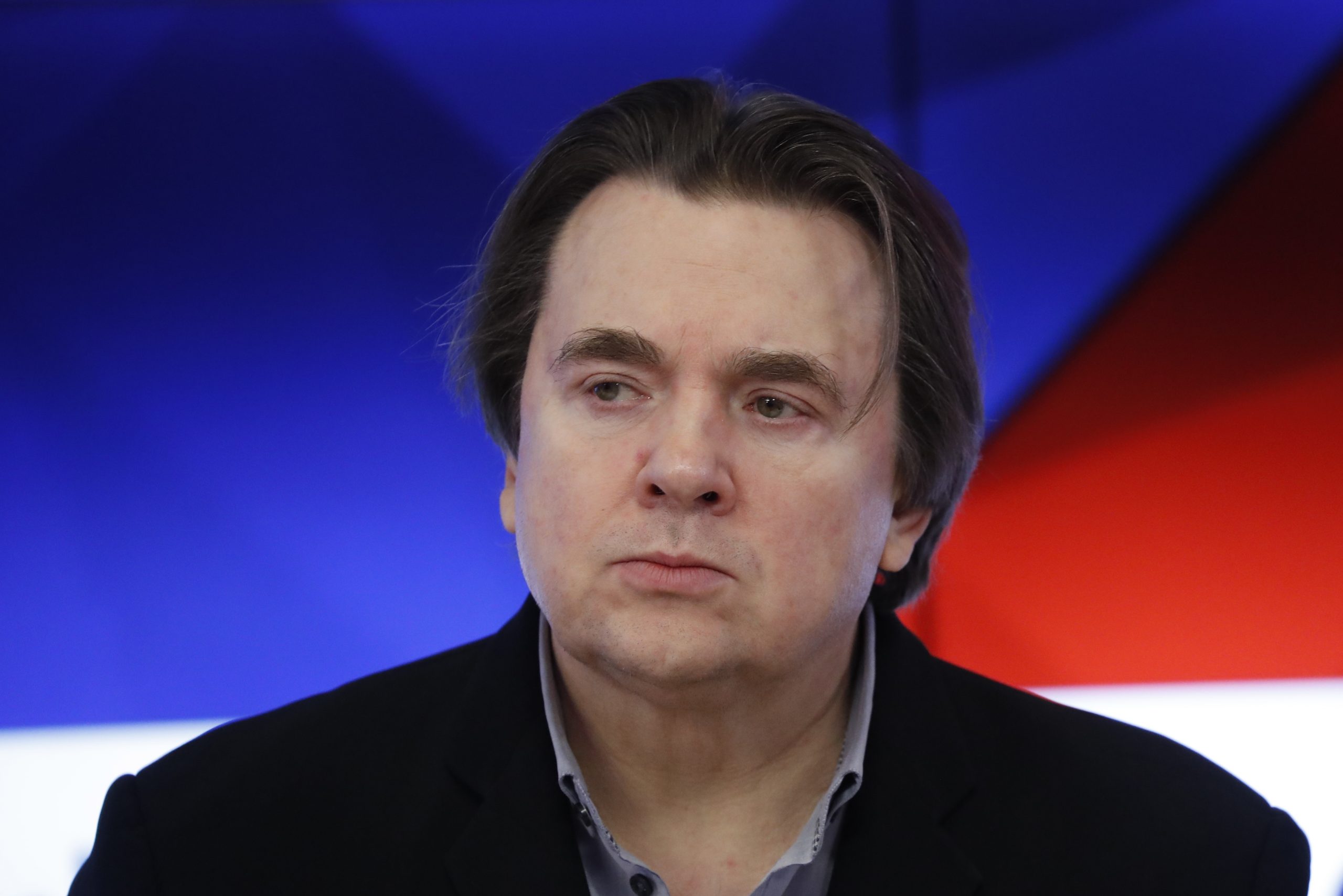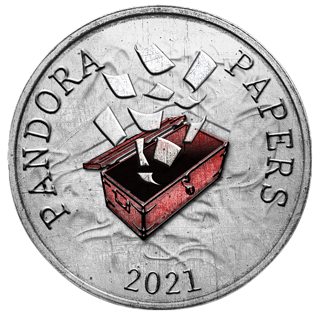As the 2014 Sochi Winter Olympics approached, Konstantin Ernst, the floppy-haired intellectual who reigns as Vladmir Putin’s chief image maker, faced the challenge of a lifetime: to produce opening and closing ceremonies spectacular enough to captivate the world – and to boost the reputation of Russia’s increasingly besieged president.
An Oscar-nominated film producer, Ernst, then 53, had been boss of Russia’s leading TV network, Channel One, for as long as Putin had been president, and he had played a critical role in creating Putin’s image as the savior of the Russian state.
But a tide of bad news had eroded Putin’s domestic support: pro-European protests in Kyiv were on the verge of toppling his ally in Ukraine; a decade of oil-fueled growth had given way to economic stagnation; and a protest movement, led by dissident Alexei Navalny, was gathering force on the streets of Moscow.
Ernst flipped the script.
In a dazzling parade of floating mountains, lakes and onion domes, heroes of the avant-garde, and more than 3,000 performers, Ernst’s Olympic spectacle recast Russia’s troubled reality into the Russia of Ernst’s imagination: powerful, creative, forward-looking, triumphant. The world cheered.
Ernst would later say that the production was a labor of love and that his pay for this achievement was just one ruble.
“It would be silly to assume that professing your love should have a price tag,” he said.
But the International Consortium of Investigative Journalists has found that on the day of the Opening Ceremony, a company was incorporated in the British Virgin Islands that would pave the way for Ernst’s secret 23% stake in a state-funded privatization deal worth a billion dollars.
Files leaked to ICIJ, and shared with 150 media partners, show that nine months after the Olympic torch was extinguished, Ernst became a secret partner in a deal to buy 39 aging but valuable Soviet-era cinemas and surrounding property from the city of Moscow. The deal was financed by VTB Bank, a state owned institution that has been referred to as Putin’s “piggy bank.”
The properties were sold at the minimum price set by a Moscow government-run auction. A legal challenge alleged that the auction was designed to effectively exclude all but the partnership in which Ernst, behind layers of shell companies, held a stake.
The leaked files also show that Ernst was the beneficiary of a $16.2 million loan – from a Cyprus bank partly owned by VTB – used to fund his stake in the deal. The files show the bank explicitly instructed offshore lawyers to keep documents detailing Ernst’s connection to the loan out of government records in the British Virgin Islands, where the shell companies concealing the deal were incorporated.
Further, the files document how Ernst was joined in the partnership by a Russian media figure who is linked to some of Putin’s closest and most powerful allies, including Ernst’s bosses at Channel One.
In an email to the ICIJ, Ernst said he had never made a secret of his involvement in the real estate project and denied any suggestion that his involvement in the project was compensation for his work on the Olympic ceremonies. He refused to answer ICIJ’s questions on the basis that ICIJ was “not an independent investigation company but an organisation commissioned by the US secret services.”
The findings are part of the Pandora Papers, a trove of more than 11.9 million files from 14 offshore law firms and service providers. The documents pull back the curtain on a financial system that allows the global 0.1% to stash their wealth away from tax inspectors, regulators and the public. ICIJ obtained the documents and shared them with journalists from 117 countries.
The documents revealing Ernst’s secret deal come from Trident Trust, one of the world’s largest offshore service providers, with offices in the British Virgin Islands (BVI), Mauritius, Singapore and other secrecy jurisdictions, including the U.S. state of South Dakota.
Russia’s corrupt system and the offshore world
The documents show that Trident officials worked with lawyers and bankers in Russia, Cyprus, the U.K and the BVI – including Russian oligarchs’ go-to London law firm – to administer corporations and loans on Ernst’s behalf.
For Russians, the offshore world plays a special role in securing the wealth of oligarchs, cronies and public officials. Vladimir Putin’s corrupt system made many of them rich and could just as easily make them poor again. Russian nationals are disproportionately represented in the Pandora Papers. ICIJ’s analysis reveals that Russians are behind about 14% of the more than 27,000 companies whose ownership details are revealed by the leak. Among them, at least 46 Russian oligarchs were using offshore companies, the analysis found.
Putin has spoken out against the use of offshore structures by Russian businessmen and politicians and has backed laws to curb the practice. But his inner circle figures prominently in the files.
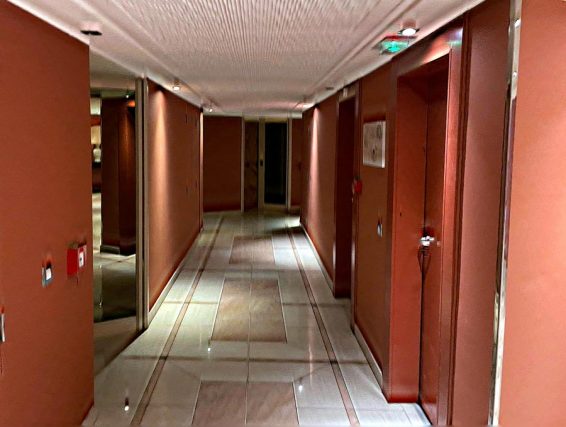
The Pandora Papers reveal that a $4 million Monaco apartment was bought through an offshore company in the fall of 2003 for a woman reported to have been in a hidden, years-long relationship with Putin. The former store cleaner from St Petersburg, Svetlana Krivonogikh, had just given birth to a girl with no father listed in official records. The online investigative news organization Proekt reported that the girl is Putin’s daughter. Krivonogikh did not respond to reporters’ requests for comment.
The documents show that Andrei Bolotov, former son-in-law of one of Putin’s close friends from the KGB was the true owner of offshore companies that received $80 million in contracts from a state-owned pipeline company run by his then father-in-law. They also show that he was in business with one of Russia’s most notorious criminal bankers. Lawyers instructed by Bolotov said that he had never received improper business advantage from personal connections, and denied any wrongdoing.
And the records reveal that a Russian company which received $500 million in contracts from Russia’s state gas company in 2013 was owned by Ruslan Goryukhin, a one-time aide to Arkady Rotenberg, billionaire businessman and Putin’s onetime judo partner. The records also show that until at least August 2016, Goryukhin owns the Palais an der Oper in Munich, a city landmark long-rumoured to have been bought by one of Putin’s friends. In January this year, activists demanding freedom for Alexei Navalny protested outside the building. A lawyer for Goryukhin said that he had paid all relevant taxes.
These Pandora Papers revelations show how the offshore world’s parallel financial system has provided the means for Russia’s elite to become fabulously wealthy at the expense of the country’s ordinary citizens.
Ernst, for instance, used offshore secrecy to obscure how he benefited from a deal to buy and develop public assets, then valued at nearly half a billion dollars, at a discount price.
The exposure of the Moscow cinema deal is the first time one of Russia’s media elite has figured in such a leak. One of the leading propagandists of contemporary Russia has been caught in a deal typical of Putin-era cronyism. It is a stark revelation of the importance the Kremlin attaches to Ernst and to the myth-making machinery that helps keep the Putin autocracy alive.
The artist as a young man
Konstantin Lvovich Ernst was one of the zlataya maladosh – the golden youth – of the late Soviet era. The son of a well-known Soviet scientist, Ernst has a PhD in genetics but his real passion lies elsewhere. He dropped out of a promising career at a state lab and passed up an offer to study at the University of Cambridge (a decision he later said had caused his mother to stop speaking to him for two years) to join the industry that would come to dominate post-Soviet culture: television.
Just over 6 feet tall and broad-chested, with dark hair, often shoulder length, Ernst cut a striking figure on the Moscow cultural scene, with his trademark leather biker jacket offset by a cherubic face and often melancholy expression.
His first break in TV was as a producer of “Vzglyad (Viewpoint),” a news and discussion program that would become one of the most influential of the liberalizing perestroika years of the 1980s, the first tv show in Russia to play foreign pop music but also broadcasting investigations into Communist Party corruption.
Even for the perestroika era, “Vzglyad” presented journalism that pushed boundaries. One of Ernst’s interviews was so controversial, a colleague recalled, Ernst had to strap the interview tapes to his belly in order to transport them back to Moscow for broadcast.
Ernst’s rise came amid a broader free-for-all that included the beginnings of a free press in Russia.
Russia was undergoing an incredible wealth transfer and social upheaval – food shortages, rampant inflation, spiking alcoholism and suicide rates – that would pave the way for authoritarian backlash.
Ernst was early to sense the public’s need for a common identity and meaning. He produced a hit series of “public advertisements” called “The Russian Project,” short films providing moral lessons in communitarian values.
Ernst caught the eye of Boris Berezovsky, an ally of then-President Boris Yeltsin, who had used his influence in the Kremlin to secure half the state’s share in its leading TV station, Channel One. He appointed Ernst chief producer in 1995 and, about four years later, appointed him CEO, just as a new president was taking power amid a collapsed economy and political chaos.
Ernst was 38.
Inventing Vladimir Putin
To the public, Vladimir Putin was almost completely unknown . To Ernst, the bland former spy and St. Petersburg deputy mayor became a sort of portrait subject, and the canvas was TV.
At Ernst’s suggestion, Putin’s first inauguration was moved from a faded bureaucratic office building to a gilded czarist-era chamber. Ernst also re-imagined the World War II Victory Day Parade in Hollywood style, with cameras in cockpits of combat aircraft. And he initiated the annual “Direct Line with Vladimir Putin,” in which the president gave expansive responses to callers from across Russia’s 11 time zones.
And, each night on Channel One’s leading news program, “Vremya,” Putin might appear as a father figure, chiding his deputies for infractions or as a glamorous airman flying a fighter jet over Chechnya. Author Arkady Ostrovsky describes Vremya as the Russian news equivalent of “a lullaby.”
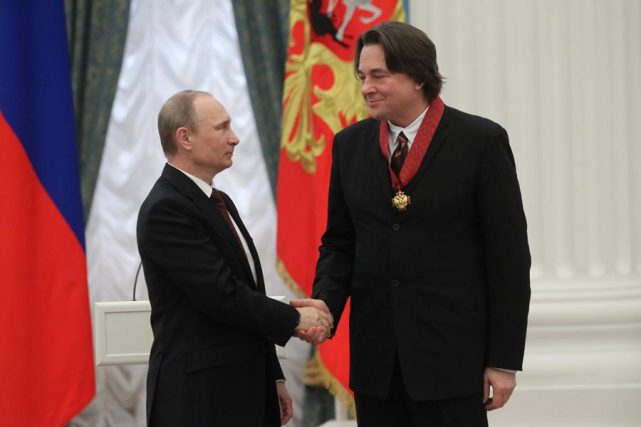
Channel One, in the early years, also showed serious documentaries and original movies, and it brought in American series, building a reputation as Russia’s cosmopolitan, less brazenly propagandistic network.
According to a former colleague, Channel One’s dual nature was a reflection of Ernst’s personal ambitions. “Ernst, with his own hands and his own design, has made Channel One to serve two major interests,” said Vasily Gatov, a U.S-based journalist and media analyst. The first of these, according to Gatov, was to establish himself as the most respected figure in Russian TV. And to do this, he made the station serve the Kremlin’s ends.
Journalist Joshua Yaffa described Ernst as the archetypal “wily man,” a term coined by Yuri Levada for a type of resourceful post-Soviet Russian who compromises himself to accommodate the state, but isn’t fooled by it. According to Levada, the wily man “not only tolerates deception, but is willing to be deceived, and [even]…requires self-deception for the sake of his own self-preservation.”
How Putin established control
As a new president, Putin famously installed friends from St. Petersburg and the KGB on the board of Gazprom, the state-owned natural gas giant and engine of the Russian economy. Gazprom would serve as the hub of Putin’s economic control. A bank owned by his close friend Yuri Kovalchuk, who would become one of Ernst’s bosses at Channel One, was put in charge of Gazprom’s multibillion-dollar pension fund. Rotenberg, Putin’s judo sparring partner, became Gazprom’s main pipeline construction contractor.
Others became reported Putin proxies. The Panama Papers revealed in 2016 that Sergei Roldugin, cellist and godfather to one of Putin’s daughters, had received, at least on paper, tens of millions of dollars in payments through offshore companies. He previously had professed to owning only an “apartment, a car and a dacha.”
And still others paid tribute. Alexei Mordashov, a steel magnate, Russia’s richest man and another future part owner of Channel One, was said to have donated money to the president’s pet projects and to have given generously to Putin’s friends. The Panama Papers showed that a company linked to Mordashov’s steel company forgave a $6 million loan to Roldugin. A spokesperson for Mordashov’s company said that, “we do not comment on inaccurate reports, which appear to be the source of your questions.” She declined to further elaborate.
And then there were the hired hands, like Ernst.
Putin took control of the media, including the country’s first privately owned TV channel, NTV. Ernst’s boss, Berezovsky, who had made the mistake of writing an open letter denouncing Putin’s centralizing “reforms,” was forced to flee abroad and sold his 49% stake in Channel One, much of which was later bought by Kovalchuk and Mordashov through their conglomerate, National Media Group.
The Kremlin and its allies now controlled the two main television networks in a country where more than 90% of the people got their news from TV.
Increasing cynicism shapes culture
Under Ernst, news unfavorable to the Kremlin disappeared from Channel One. The young director fired the channel’s premier news anchor after he criticized Putin’s handling of the Kursk submarine disaster that killed 118 crew members in August 2000. And during the 2004 Beslan school massacre, in which more than 330 children, teachers and parents were slain by Chechen terrorists after a botched Russian army rescue mission, Channel One cut to a Brazilian soap opera. The names of dissidents, like Navalny, were never uttered on-air, no matter how popular they became.
In a 2004 interview with the Financial Times, Ernst articulated a philosophy that combined a belief in the inherent primacy of the state with a cynicism about the value of journalistic truth.
“Russia needs consolidation,” he said. “Today, Putin is the person who can do it.” He dismissed the independent press that had emerged during the Yeltsin era as an “irritant.” “There is,” he added, “no such thing as an absolute freedom of speech … Everything depends on your purpose.”
Later, he would expound more cynical views. “It’s become increasingly clear to me that justice, democracy, the complete truth – they don’t exist anywhere in the world,” he told the New Yorker in 2019. Ernst has defended Channel One’s failure to report on the Putin family’s alleged wealth, saying “society is in no way put in danger” by the omission.
Ernst’s relativism, which downplays Russian authoritarianism and corruption by pointing to the West’s imperfections, has become a popular defense of Putin’s regime. It justifies the propaganda in Channel One’s reporting by asserting that all media representations are influenced by the observer’s perspective. Truth, therefore, is unattainable, and one angle is as valid as another.
In his 2014 book, “Nothing is True and Everything is Possible,” the writer Peter Pomerantsev describes how the repudiation of truth, and the dissonance between the authorized version of Russia and the actual one, has created in Russia a kind of mass disorientation, resulting in a general disengagement from politics and the abandonment of hope that a democratic alternative to Putinism is possible.
But by 2014, reality was catching up to Putin. His return to the presidency in 2012 after having switched, officially, to prime minister because of term limits, was greeted with protests against the state’s extravagant corruption. Navalny’s allies used YouTube and online publishing to circumvent Ernst’s messaging apparatus. To the west, noisy demonstrators in Kyiv occupied Maidan square and drove a Putin ally from power. And international press coverage of the Sochi games included reports of grand-scale corruption in the country’s spending of $51 billion on the Olympic Games.
The rapturously received opening ceremony changed the narrative. Ernst’s phantasm of music and spectacle gave the world a vision of another Russia. In it, a young girl named Lyubov (Russian for “love”) floated on hidden wires through otherworldly landscapes of floating lakes, fiery volcanoes, wooden churches and snowy tundra, all lit by a dreamlike crescent moon. The triumphal march through Russian history hailed the country’s heroes and achievements of empire, science, the arts: Catherine the Great, the cosmonaut Yuri Gagarin, the periodic table, invented by Russian chemist Dmitri Mendeleev, the painter Vassily Kandinsky, the composer Tchaikovsky, the literary giants Dostoevsky, Tolstoy, Chekhov.
Praise rained down on him for the “dazzling” ceremony. Even Navalny had to call it “unifying.”
Ernst described the opening ceremony as an opportunity to “bring my compatriots together in one emotion,” and he said the games, “told the world that Russia is taking the world-power status back.”
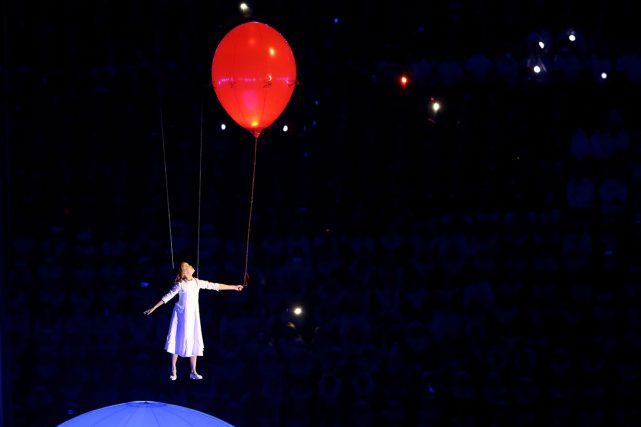
A new company in the Caribbean
The law offices of Tulloch & Co. sit in a quiet corner of Mayfair in London’s posh West End. Run by a low-profile South Africa-educated solicitor, Alastair Tulloch, the firm counts Elton John and the Duke and Duchess of Sussex (Prince Harry and Meghan Markle), as clients. But it has also become known for its work securing the assets of Russia’s newly minted super-rich.
Long the offshore world’s beating heart, London has played a particularly important role in the looting of the former Soviet bloc. In the Putin era, London has become the go-to center for the Russian elite: the place for them to party, to invest, to send their kids to school.
According to academic estimates, the richest Russians, by 2015, held as much in offshore centers such as London as all Russian households owned in Russia.
But even in a city awash with the purloined assets of former Soviet republics, Tulloch’s small firm stands out. Previous exposés in the U.K press showed how the partnership helped structure trusts for Kremlin-linked Russian nationals.
And now, the Pandora Papers reveal that Tulloch’s firm structured networks of companies for former Russian Deputy Finance Minister Andrey Vavilov; Alexander Mamut, a billionaire oligarch and political insider; and Vitaly Zhogin, a banker wanted in Russia for alleged fraud. Tulloch used Trident Trust to arrange for their assets to be transferred to shell companies – like the thousands of Russian-owned companies already in the files – registered in the British Virgin Islands, Cyprus and the Bahamas, all secrecy jurisdictions.
On Feb. 7, 2014, the day of Ernst’s Olympics opening spectacle, leaked Trident Trust records show, Tulloch incorporated a new BVI limited company, Moscow Dvorik Ltd.
“Dvorik” is Russian for courtyard,and “Moskovsky Dvorik” is the name of a 19th-century painting by Vasily Polenov that depicts a peaceful, green corner of Moscow, with a golden church dome in the background. The name evokes a kind of traditional old-Moscow architecture largely destroyed by a corruption-fueled property boom in the 1990s. Tulloch did not respond to ICIJ’s requests for comment.
An auction of Moscow city property
A few months after Moscow Dvorik was incorporated, a Moscow government official announced a large-scale urban redevelopment project – beginning with the auction of 39 city-owned Soviet-era cinemas in a single package, one of Moscow’s biggest sales of public real estate in years.
The buildings were located mainly between the third and fourth ring roads in Moscow’s bedroom suburbs, and some were dilapidated. But many of the cinemas were classics of later Soviet architecture, and together they covered more than 90 acres of prime Moscow land.
An anti-corruption activist cried foul. Dmitry Baranovsky, an independent city council member representing northeast Moscow, filed a complaint with the local competition authority. He alleged that the only reason to sell all 39 in a single lot was “the presence of a ‘big’ buyer.” Selling them together, he said, was “a way to eliminate other, smaller bidders from the auction.”
The complaint contended that the minimum allowable bid – just under $200 million – had undervalued many of the cinemas. Records collected by a lawyer from Navalny’s anti-corruption foundation indicate that the taxable value of the buildings and surrounding land was about $465 million – more than double the asking price.
The city government told the competition authority it had repeatedly tried to sell the cinemas in smaller lots.
In its ruling, the authority said that the city’s requirements for recreational and cultural spaces “significantly reduces the potential attractiveness for investors” and that the price had been based on a valuation by an independent appraiser.
The authority added that, while it agreed that the way the properties had been valued “may violate the applicable law,” the matter of the valuation was outside its purview and declined Baranovsky’s petition to obtain the appraiser’s report justifying the price.
The auction was allowed.
Scooping up the theaters for the minimum price was a Russian company, Edisonenergo LLC, affiliated with an established Moscow development company.
The development company was headed by two brothers, Grigory and Mikhail Pecherskiy, who had built malls in their hometown of Kaliningrad on the Baltic Sea. Grigory Pecherskiy, a regular on the Moscow art scene with long curly hair and thick framed glasses, was the public face of the project. His company’s design was based on the concept of the communal courtyard, a “dvorik.” The cinemas and surrounding property would be rebuilt as “neighbourhood centres,” home to malls, cinemas, and cultural space.
Pecherskiy told the press that the Edisonenergo’s owners, who were not identified, had used their own funds to buy the buildings and that the Pecherskiy firm would invest an additional $800 million, with a $600 million line of credit put up by one of the most politically wired lenders in Russia, VTB Bank.
The role of VTB and a Cyprus bank
Sanctioned by the U.S. and the European Union in 2014 after Russia’s military intervention in Ukraine, VTB has been described as a “completely controlled bank” by former U.S Ambassador to Russia Michael McFaul, a professor at Stanford University. The bank has denied that it is controlled by the Kremlin.
The secrecy surrounding other partners in the mega-project touched off a flurry of speculation that they included Kremlin-linked elites. In a 2017 interview, Grigory Pecherskiy did not deny reports that the deal included Sergei Vasiliev, the longtime director of Russia’s leading advertising group, Video International, whose ownership was linked to Mordashov and Kovalchuk,the billionaire Putin allies and part owners of Ernst’s Channel One. ICIJ’s Panama Papers investigation showed that part of Video International was also owned by Roldugin, the cellist and godfather to one of Putin’s daughters. Video International ceased operations in 2016.
In the same 2017 interview, with the leading Russian business newspaper Kommersant, Grigory Pecherskiy was also asked if the partners included Ernst.
“It would be a very beautiful story,” Pecherskiy responded. “But alas, this is not the case.”
The Pandora Papers show the public-facing Pecherskiy brothers were actually minority partners in the project.
The records show that the Pecherskiy affiliated company that won the auction, Edisonenergo LLC, was owned by a Cypriot-registered company, which was in turn owned 50-50 by two other shell companies.
One of the owners, Xelio Invest Ltd, leads to a dead end; the sole shareholder listed in Cyprus records is yet another firm, this one registered in the BVI, where public records do not disclose the true owners.
The other was Moscow Dvorik, the BVI-registered company that Alastair Tulloch set up the day of the Sochi opening ceremony. Its owners are revealed by the Pandora Papers.
Moscow Dvorik’s half was split this way: The Pecherskiy brothers owned 33%, the records show. Vasiliev owned 20%.
And 46.9% of Moscow Dvorik, or about a fourth of the overall development, was owned by a BVI-registered firm called Haldis Corp.
And, the records show, Haldis was wholly owned by Ernst.
What’s more, the Pandora Papers show that, in December 2014, several months after the Olympic ceremonies, a Cyprus bank known as RCB, a former unit of VTB and still partly owned by it, a made a loan of $16.2 million to Ernst’s company, Haldis, which used the money to pay for its stake in Moscow Dvorik and the overall development.
In other words, Ernst’s secret stake in the billion-dollar deal was acquired with a loan to his anonymous shell company from a Cyprus bank partly owned by Kremlin-linked VTB.
The Pandora Papers show that RCB’s lawyers took the extra step of instructing Trident Trust officials not to include the “annotated share register,” linking Haldis to Ernst, among official BVI records. Trident was to maintain those records at its offices instead. An email from RCB’s BVI lawyers, at Harneys, explained that those instructions were “conditions of the financing provided by RCB Bank.”
Citing banking confidentiality rules, RCB declined to say why it gave those instructions or whether such instructions are common practice.
RCB’s head of corporate affairs, Maratheftis Michalis, told ICIJ in an email: “Whether the share registers are filed or not to the relevant registry, depends on each lending case and we want to categorically state that we meticulously follow all the regulations and requirements of each case accordingly.”
“That is, we file whenever that is required and do not do so when and if that is not required.”
He added that RCB, “does not conduct its business with any mark or form of secrecy whatsoever.”
The Pandora Papers show that Vasiliev, too, got a loan from RCB.
In total, records show, the Cyprus banking unit gave loans totaling $96 million to offshore companies with stakes in the development – including the mysterious Xelio — on top of the $600 million credit line from VTB Bank. Citing banking confidentiality, VTB said that it could not comment, but added that ADG Group had a “solid business reputation.”
Neither ADG Group nor the Pecherskiy brothers responded to ICIJ’s requests for comment, or questions about who is behind the secret 50% owner of the project. ADG Group’s website says that the cinema development is Moscow’s biggest retail project, and “is aimed at driving new quality of life for 2.5 million Muscovites.”
In an email exchange with ICIJ Ernst denied having done anything illegal, saying that “this is how my parents raised me.”
He also denied having hidden his involvement in the real estate development: “I’m indeed involved in [the] Moskovsky Dvorik Project and I’ve never made a secret of that.”
He said: “I’m not going to answer your questions, not because I’m afraid of anything, only because I’m more than sure you are not an independent investigation company but an organisation commissioned by the US secret services. And that has nothing to do with the independent journalism.”
He later sought to retract his statements when ICIJ did not agree to publish his email in full.
His spokesperson said: “Since you’re not planning to publish Mr Ernst’s answer in full we have to retract his text and forbid usage of any parts of it or mentioning the above-mentioned answer.”
A spokesperson for Trident Trust said that each of its businesses was fully committed to compliance with all applicable regulations.
The use of a dubious auction to move valuable public assets to secret owners who turn out to have links to the Kremlin, financed by loans from a Cyprus bank partly owned by VTB reads like something out of the playbook of crony capitalism under Putin. It is a miniature version of the scenarios that Putin has presided over in energy, in media and across the Russian economy, and it provides insight into how Russia became one of the most unequal countries in the world.
After the applause
The events of 2014 changed Russia and redrew the map.
In response to the Maidan Revolution, Putin annexed Ukraine’s Crimean Peninsula and funded a separatist war in eastern Ukraine, provoking Western sanctions and global condemnation but radically boosting his domestic political fortunes.
Channel One’s news programs presented the revolution in Ukraine as a Western plot carried out by fascists, and the channel amped up its broadcasts of outright fake reports. Among them: that “fascists” aligned with the new Ukrainian government had “crucified” a 3-year-old boy; and that the downing of the Malaysia Airlines Flight 17 – which killed 283 passengers and 15crew members and was linked to agents with ties to Russian military and intelligence agencies – was perpetrated by the Ukrainian air force.
Polling conducted by the Levada Center, an independent sociological research organization, showed that Russians saw the annexation of Crimea as a sign of Russia’s return to superpower status. Putin’s popularity jumped almost 30 points from its November 2013 low point.
Meanwhile, an oil price crash midway through the year more than halved Channel One’s advertising revenue and made it increasingly dependent on its owners for financial support. In the fall of 2014, a former member of Parliament from Putin’s party, long rumored to be a girlfriend of the president, was appointed chair of a major Channel One shareholder, National Media Group. She has previously denied the relationship. The appointment seemingly ensured that the broadcaster’s largest private shareholder was controlled by a close ally of the president.
Ernst also oversaw the launch of “Vremya Pokazhet” – “Time Will Tell” – a political talk show that presented such fare as the music video for an anthem popular with Russian-backed separatists in Ukraine. The video intercut images of Ukrainian protesters with scenes from Nazi parades.
Having not mentioned Navalny’s name for almost a decade, Channel One now routinely refers to him as “a swindler and a thief” and a man of “low cunning.” It airs conspiracy theories that he is a foreign agent.
Meanwhile, the Kremlin has designated the remaining independent media as “foreign agents,” putting staff members at risk of jail time, or “undesirable,” making it a criminal offense to publicize their work.
This year, police raided the homes of journalists with IStories, an ICIJ partner, and another investigative news organization, Proekt, in connection with spurious legal proceedings. Thirty percent of independent journalists said they have faced administrative or criminal prosecution, according to a recent poll by the Levada Center.
A happier ending for Ernst
Lately, Ernst has been photographed on Moscow’s red carpets with his wife, Sofya Zaika, an actor around half his age, after he split with his longtime collaborator, Larisa Sinelshchikova. He is part owner of a string of high-end Moscow restaurants and lives in the same elite apartment block as the foreign minister, Sergey Lavrov.
And, the Pandora Papers show, Ernst, through another BVI-registered company, secretly owns an oil painting called “The Anger of Achilles” by 19th-century French artist Jacques-Louis David. Due diligence documents stated the painting was worth $6.2 million. The painting depicts the Greek demigod reaching for his sword as the tyrant Agamemnon leads his daughter to be sacrificed. David did two versions of the painting. One version, painted in 1819, hangs in the Kimbell Art Gallery in Fort Worth, Texas, which says it has owned the painting since 1980. Ernst said that he had never seen the painting in the Kimbell, “but I will check it out should the opportunity arise.” He didn’t respond to a question about whether he owns David’s near-identical 1825 depiction of the same scene.
Official accolades have poured in. On his 60th birthday this year, Ernst was hailed as “innovator, hero of the day” and awarded Russia’s highest order, “For Merit to the Fatherland, First Class,” for his “great contribution to the development of national culture and art.”
By the end of 2019, Ernst’s stake in the cinema development was worth around $140 million, according to Cypriot corporate records.
Additional reporting: Roman Anin, Agustin Armendariz, Emilia Díaz Struck, Roman Shleynov, Mauritius Much, Stelios Orphanides, Greg Miller, Luke Harding.

